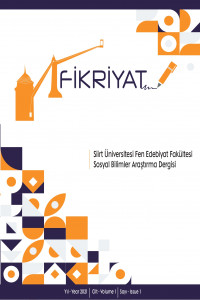Abstract
19. yüzyılın önemli ve etkili simalardan Nietzsche, öğretisiyle ön plana çıkan düşünürlerdendir. Tanrı, Güç İstenci, Üstinsan, Bengi Dönüş ve Amor Fati gibi kavramlar, onun öğretisinin temelinde yer alan önemli kavramlardır. Bilhassa Tanrı ve Üstinsan ikilisi, çalışmamızın temelinde yer almaları itibarıyla ayrı bir öneme sahiptir. Nietzsche öncelikle insanları; sürü insanı, özgür insan ve üstinsan olarak üçe ayırmaktadır. Ona göre insanlar uzun bir müddet, sürü insanı olarak yaşamlarına devam etmiştir. Ama böyle bir yaşam tarzı, insanın asli doğasına uygun bir yaşam biçimi değildir. Bu nedenle insanın bu yaşam biçiminden bir an önce kurtulması ve daha üst bir aşama olan üstinsan mertebesine yükselmesi gerekir. Bunu yapabilmesi ise ancak Tanrı’yı öldürmesi ve onunla ilgili olan tüm ahlaki değerlerden kurtulması ile olanaklı olabilir. Çünkü Tanrı, insanın kendisini aşmasının önündeki en büyük engeli teşkil etmektedir. Nietzsche; ‘Tanrı Öldü’ ve ‘Yaşasın Üstinsan’ diye haykırarak, artık üstinsanın zamanı geldiğini ilan etmektedir. Ama Tanrı inancı ve onunla bağlantılı olan her tür ahlaki değerler, insan yaşamında gerek bireysel ve gerek toplumsal birtakım önemli işlevler yerine getirmektedir. Bu işlevler insan yaşamında önemini korumaya devam ettiği süre içinde, Tanrı’yı öldürüp onun yerine geçmek söz konusu olamaz. Bu nedenle Nietzsche’nin Tanrı Öldü! ve Yaşasın Üstinsan! söyleminin hiçbir olgusal tarafının olduğu söylenemez. O halde Nietzsche’nin üstinsan doktrini; bir beklentinin, bir umudun, bir düşün veya bir kurgunun dışavurumundan öteye geçen başka bir şey değil diye yorumlanabilir.
Keywords
References
- Akarsu, Bedia (1979). Çağdaş Felsefe. İstanbul: Milli Eğitim Basımevi.
- Ansell-Pearson, Keith (1998). Kusursuz Nihilist. Çev. Cem Soydemir, İstanbul: Ayrıntı Yayınları.
- Armstrong, Karen (2007). Tanrı’nın Tarihi. Çev. Oktay Özel, Hamide Koyukan ve Kudret Emiroğlu, İstanbul: Pegasus Yayınları.
- Augustinus (2010). İtiraflar. Çev. Çiğdem Dürüşken, İstanbul: Kabalcı Yayınevi.
Abstract
Nietzsche, one of the important and influential figures of the 19th century, is one of the thinkers who prominent with his teaching. Notions such as God, the will to power, Superman, eternal recurrence, and amor fati (love one's own destiny) are important concepts that underlying at the basis of his teaching. Because they are at the core of our work, especially the duo of god and superman, has a special importance. Nietzsche primarily divides the people into three groups as a herd man, a free man, and a superman. According to Nietzsche, people continued their lives as a herd man for a long time. But such a way of life is not a appropriate lifestyle for human nature. Therefore, a person should get rid of this lifestyle as soon as possible and rise to the status of superhuman, which is a higher stage. This can only be possible by killing God and getting rid of all moral values associated with him. Because God is the greatest obstacle that prevents man from challenging himself. Nietzsche; Shouting “God is dead” and “Long live the superman”, he declares that it is time for the superman. But belief in God and all moral values associated with it fulfill some important functions both individually and socially in human life. As long as these functions continue to be important in human life, it is out of the question to kill God and replace him. For this reason, it cannot be said to have any factual side of Nietzsche's expressions: “God is dead!” and “Long live the Superman!”. So Nietzsche's superman doctrine can be interpreted as nothing more than the manifestation of an expectation, a hope, a dream, or a fiction.
Keywords
References
- Akarsu, Bedia (1979). Çağdaş Felsefe. İstanbul: Milli Eğitim Basımevi.
- Ansell-Pearson, Keith (1998). Kusursuz Nihilist. Çev. Cem Soydemir, İstanbul: Ayrıntı Yayınları.
- Armstrong, Karen (2007). Tanrı’nın Tarihi. Çev. Oktay Özel, Hamide Koyukan ve Kudret Emiroğlu, İstanbul: Pegasus Yayınları.
- Augustinus (2010). İtiraflar. Çev. Çiğdem Dürüşken, İstanbul: Kabalcı Yayınevi.
Details
| Primary Language | Turkish |
|---|---|
| Journal Section | Research Articles |
| Authors | |
| Publication Date | June 30, 2021 |
| Published in Issue | Year 2021 Volume: 1 Issue: 1 |

